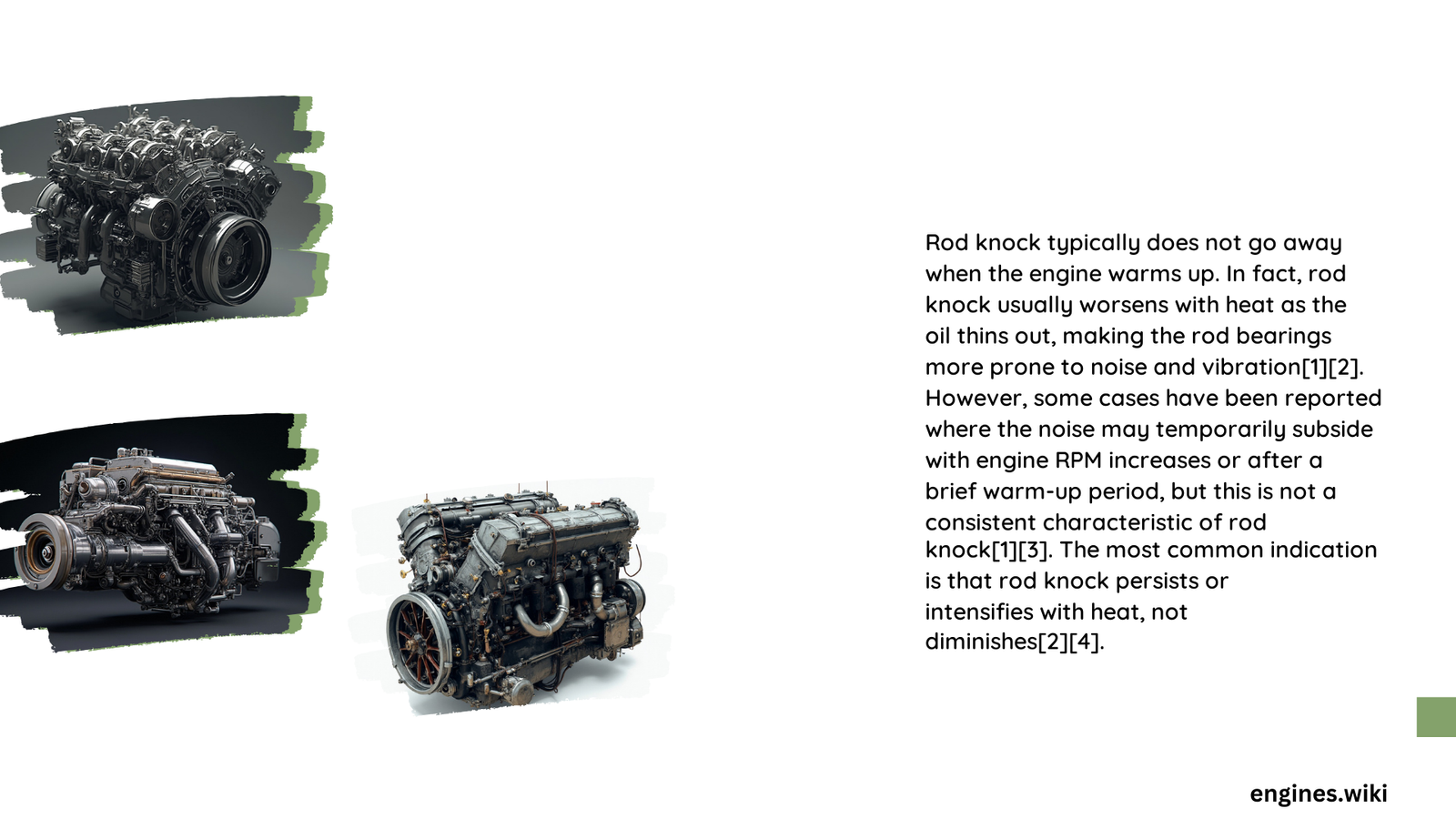Rod knock is a serious engine issue that can cause significant damage if left unaddressed. Many drivers wonder if this problematic noise disappears as the engine reaches its operating temperature. While rod knock may change in intensity as the engine warms up, it typically doesn’t completely vanish. This article explores the relationship between engine temperature and rod knock, providing insights into its causes, symptoms, and potential remedies.
What Happens to Rod Knock as Engine Temperature Rises?
Rod knock doesn’t necessarily disappear when the engine warms up, but its characteristics can change:
- Noise Intensity: The knocking sound often becomes less pronounced as the engine reaches operating temperature (180°F to 220°F).
- Metal Expansion: As engine components heat up and expand, the metal-on-metal contact causing the knock may temporarily reduce.
- Lubrication Improvement: Warmer oil flows more freely, potentially providing better lubrication to affected areas.
However, it’s crucial to note that the underlying issue causing rod knock remains present, even if the noise diminishes.
How Does Rod Knock Manifest at Different Engine Temperatures?

Rod knock symptoms can vary depending on the engine’s temperature and RPM:
- Cold Start (Below 100°F):
- Louder, more pronounced knocking
-
More frequent occurrences of the noise
-
Warming Up (100°F – 180°F):
- Gradual reduction in noise intensity
-
Possible intermittent knocking
-
Operating Temperature (180°F – 220°F):
- Potentially softer knocking sound
-
May seem to ‘disappear’ but often still present
-
High Temperature (Above 220°F):
- Knocking may intensify again
- Risk of further engine damage increases
What Causes Rod Knock to Persist Even When the Engine is Warm?
Several factors contribute to the persistence of rod knock, even after the engine warms up:
-
Bearing Wear: Worn connecting rod bearings create excess clearance, leading to metal-on-metal contact regardless of temperature.
-
Crankshaft Damage: A bent or damaged crankshaft can cause persistent knocking.
-
Piston Damage: Cracked or damaged pistons may continue to produce knocking sounds at all temperatures.
-
Insufficient Lubrication: Even with warm oil, severely worn components may not receive adequate lubrication.
-
Overheating: Excessive heat can warp engine components, exacerbating the knocking issue.
Can Engine Warm-Up Techniques Reduce Rod Knock?
While proper warm-up procedures won’t eliminate rod knock, they may help minimize damage:
- Gradual Acceleration: Avoid high RPMs until the engine reaches operating temperature.
- Idle Time: Allow 30-60 seconds of idle time before driving, especially in cold weather.
- Smooth Driving: Drive smoothly for the first few minutes to allow even heat distribution.
| Warm-Up Technique | Potential Benefit |
|---|---|
| Gradual Acceleration | Reduces stress on engine components |
| Brief Idle Period | Allows initial oil circulation |
| Smooth Initial Driving | Promotes even heat distribution |
What Role Does Oil Play in Rod Knock and Engine Warm-Up?
Oil is crucial in managing rod knock and engine warm-up:
- Viscosity: Proper oil viscosity ensures adequate lubrication across temperature ranges.
- Quality: High-quality oils maintain their protective properties better at various temperatures.
- Level: Maintaining the correct oil level is essential for proper lubrication.
Oil Recommendations for Minimizing Rod Knock:
- Use the manufacturer-recommended oil viscosity.
- Consider synthetic oils for better temperature stability.
- Maintain regular oil change intervals.
- Check oil levels frequently, especially if experiencing rod knock.
Are There Any Quick Fixes for Rod Knock During Engine Warm-Up?
While there are no guaranteed quick fixes for rod knock, some temporary measures may help:
- Oil Additives: Some products claim to reduce engine noise, but effects are often minimal.
- Engine Flush: A professional engine flush may help if sludge is contributing to the issue.
- Higher Viscosity Oil: Temporarily using a slightly higher viscosity oil may reduce noise, but consult a mechanic first.
Caution: These are not long-term solutions and may mask underlying problems.
When Should You Seek Professional Help for Rod Knock?
If you experience rod knock, regardless of whether it changes with engine temperature, seek professional help immediately:
- Persistent Noise: Any consistent knocking warrants inspection.
- Performance Issues: Reduced power or efficiency alongside knocking is concerning.
- Check Engine Light: If the light accompanies the knock, have it diagnosed promptly.
- Oil Pressure Warning: Low oil pressure with knocking requires immediate attention.
Conclusion: Does Rod Knock Really Go Away When the Engine Warms Up?
In conclusion, while rod knock may seem to lessen or change as an engine warms up, it doesn’t truly ‘go away.’ The underlying mechanical issue remains present, even if the symptoms temporarily subside. Proper maintenance, including regular oil changes and adhering to manufacturer-recommended service intervals, is crucial in preventing rod knock. If you experience rod knock, regardless of engine temperature, it’s essential to have your vehicle inspected by a qualified mechanic to prevent further damage and ensure safe operation.
References:
1. Understanding Rod Knock: Key Insights on This Engine Issue
2. Does \”Rod Knock\” go away when an engine is warmed up?
3. Cold start knock
